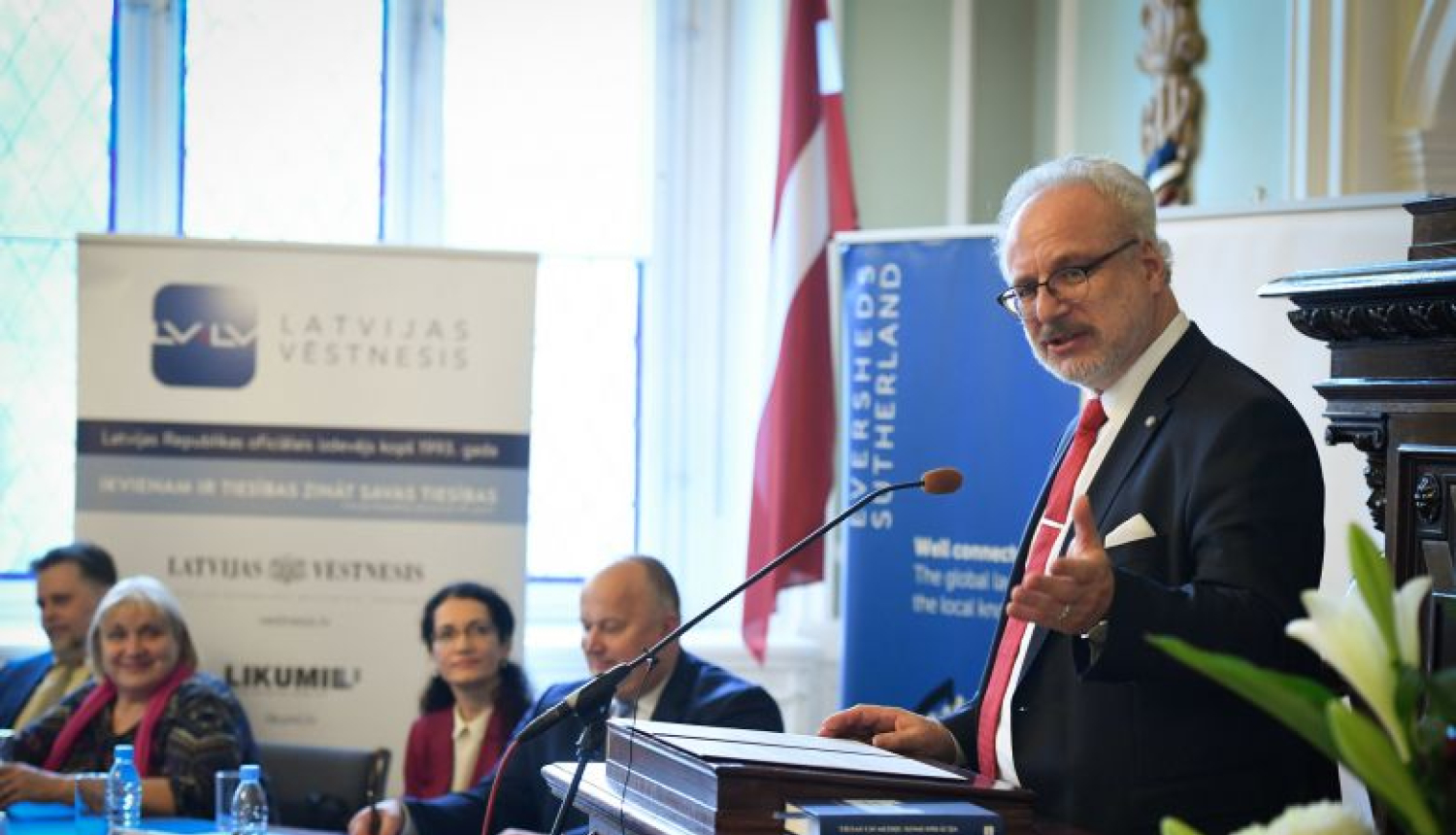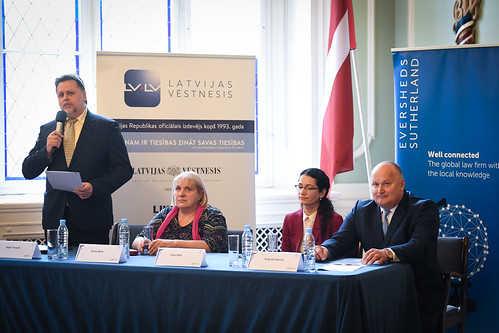Dear authors,
Dear ladies and gentlemen,
I would like to specifically highlight the role of professor Balodis who initiated this project in the publishing of this book. Mr Balodis, thank you for your commitment because of which we are now able to hold this book in our hands.
I
Let me underline that the public opinion of courts is largely shaped by media. Therefore, the 'fourth estate' is to some extent responsible for raising the prestige and public trust in judiciary.
Objective court media coverage depends on journalist's sense of justice and legitimacy. It also depends on journalist's personal willingness to thoroughly investigate and give comprehensive event report.
Journalists quite often project their views on the work of courts. People read news headlines which contain concise and often vague messages that are further interpreted by people in their own way. However, a detailed and precise account of events requires journalist to be able and have talent to report and interpret information that is communicated to the journalist, to have critical thinking and ideally create trust with court representatives.
II
I would like to underline the importance of trust in democratic societies. I would even say it is the main asset which drives the democratic political systems. In parliamentary democracies we, the voters, elect our representatives to the parliament, parliamentarians then give their vote of confidence to the government. It is a credit of trust. If these institutions 'pay back the credit of trust' the way we as 'lenders' expect, trust, of course, is extended. If the 'credit of trust' is not returned, reputation and actually the ability of the sate to function, of course, is tarnished.
Notion of trust is also paramount to courts. Contrary to politicians, courts are not elected and we all trust the professionalism of judges. We, the society, do not study judgements and reasoning and we automatically assume that 'once a judge has passed the ruling, it must be fair and just'.
So, the central question here is whether courts are succeeding in meeting these demands. Judiciary fully depends on people's backing. Contrary to politicians who need to live up to people's trust, and if you fail that trust, you are replaced by other political force, judiciary is not replaced when it loses trust. Judges, as we all know so well, because of other reasons are independent and mostly appointed for life. For them the issue of trust is, therefore, even more important than for politicians. Where does this trust come from? Well, it comes from our trust in their ability to work honestly and professionally.
III
Media can either strengthen or destroy such trust. Journalists are responsible for what they report and views they purport and how all that influences the judiciary, depriving it of its ability to function properly. It is not only about judgements. Judgements in most cases concern two parties - the one that has won the case and the other that has conceded. Judgements also indirectly affect the societies in general. In other words, looking at judgements, we either think they are fair or unfair, and our understanding of fairness is heavily influenced by the perspective of the media.
Preconceived notions and biased public opinions influence courts and may lead to public opinion that an unlawful judgements is, for example, a fair judgement because people think it must be just, although it contradicts the law. In such circumstances, especially when publicly available information is predominantly not supported by evidence, judges as the ultimate source of fairness in the eyes of the people must be able explain the actions of court in a comprehendible, accessible and understandable manner and at the same time maintain their integrity and adjudicate in a way they see fit and fair. They must be able to distance themselves from public opinions. We all know that it is not always the case. That is why the strength of character of judges is important. They must be able to withstand the pressure of media.
IV
Our judiciary is still developing. There has been strong focus on strengthening the reputation and integrity of courts. Considering that high integrity of courts is crucial for the whole country, we need to promote the public awareness about the role of courts. And that, as Mr Strupaitis mentioned, is one of the duties of journalists who do the in-court coverage. This duty does not imply reporting without questioning. It is not about reporting what courts considered and how judgements were made or what press releases say about the ruling. It is about critical assessment of the performance of courts.
Critical assessment implies that views need to be informed and, frankly speaking, if we take the news reports of judgements, there are very few well-founded assessments of court performance. I would like to urge media to train their reporters on how to cover court activities. International media often employ journalists who specialise in court reporting. Our media do not do that. I am not suggesting that our media should have journalists that do only court coverage, I am talking about journalists who are, inter alia, capable of producing well-informed and meaningful reports about courts and give critical assessment of the performance of judiciary. That is my message and wish to journalists.
V
My message and wish to judges is to see judgements that are not influenced by media. Judgements that do not incorporate independent media views on judicial system and what media think would be a fair judgements in particular circumstances. Judges have to be able to explain the judgements or their reasoning to people without legal background in a comprehendible manner. Although I have legal background, when reading a recent judgement in one of cases I too had to read it several times to make sense of it. Maybe we should adopt the Anglo-Saxon tradition of issuing two versions of judgements (and also administrative acts) - one in 'legal language' and one in more simple language accessible to general public. This is my proposal based on what I have read in this book, which is the first such publication in the history of legal science that focuses on communication between courts and media, or more broadly the communication between courts and society.
VI
This book is a valuable source of information for both the journalists and judges, which would also apply to lawyers in general. I would even say that it applies to the whole society. Therefore, I am deeply thankful to Mr Balodis for the idea and all the authors for their contribution in bringing this book to its readers!





